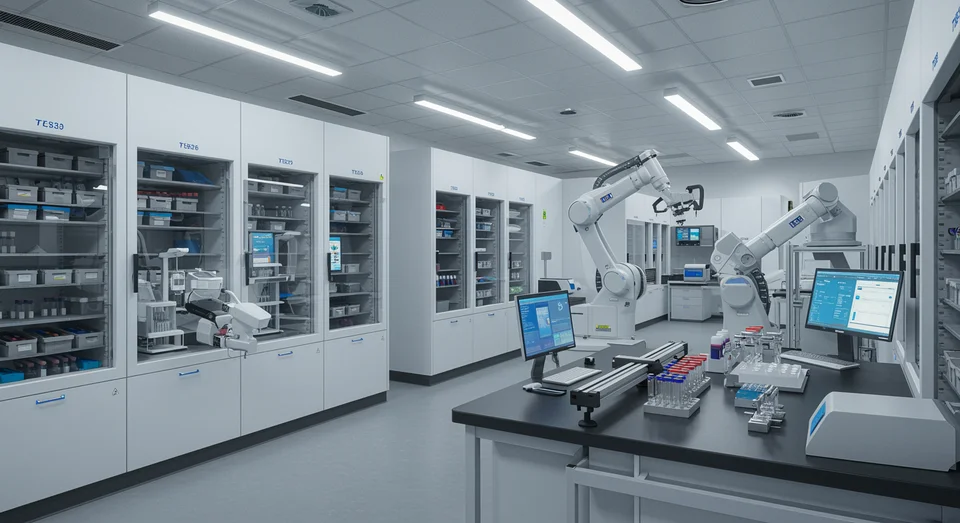Automated Sample Storage Systems Market Poised for $3.5 Billion Growth by 2035
309 views
The Automated Sample Storage Systems Market, a niche yet increasingly vital segment of the healthcare and life sciences industry, is poised for remarkable growth, with projections estimating its expansion from USD 1.86 billion in 2024 to USD 3.5 billion by 2035. This robust trajectory, marked by a compound annual growth rate (CAGR) of 5.89%, underscores the transformative impact of biobanking, personalized medicine, and cutting-edge technological advancements. As the world pivots toward precision healthcare and sustainable solutions, the evolution of these systems offers a glimpse into the future of medical research and diagnostics.

The Rise of Intelligent Storage: A Market in Transformation
In an era where data and biological samples are the lifeblood of scientific discovery, automated sample storage systems have emerged as indispensable tools in laboratories, biobanks, and pharmaceutical companies. The market’s rapid acceleration is fueled by a confluence of factors, including innovations in robotics, cryogenics, and cloud-based inventory systems. These advancements are not merely enhancing storage capabilities but revolutionizing how researchers access and utilize biological materials.
North America currently stands as the market leader, generating USD 0.75 billion in revenue in 2024, thanks to its well-established healthcare infrastructure and substantial investments in biobanking and clinical research. Europe follows with USD 0.55 billion, driven by its robust pharmaceutical sector and genomics research initiatives. Meanwhile, Asia-Pacific is emerging as the fastest-growing region, propelled by rising healthcare investments, burgeoning clinical trial activity, and a growing focus on personalized medicine. This geographical diversity reflects the global demand for efficient and scalable sample storage solutions.
The market’s segmentation further highlights its versatility. Applications range from biobanking and pharmaceuticals to clinical research and genomics, while storage types include liquid nitrogen systems, mechanical freezers, and automated cryogenic storage. The diversity of sample types—blood, tissue, cellular material, and DNA/RNA—adds another layer of complexity, necessitating adaptable and modular storage systems.
Prominent players like Eppendorf, Thermo Fisher Scientific, and B Medical Systems are at the forefront of this transformation, leveraging automation, artificial intelligence, and sustainability to redefine industry standards. Recent strategic partnerships and acquisitions have catalyzed innovation, with companies focusing on modular systems that offer scalability and cloud integration for real-time monitoring and inventory management. The shift from traditional cold storage to smart, automated ecosystems represents a paradigm change, emphasizing precision, efficiency, and environmental responsibility.
A Convergence of Science and Sustainability
The increasing demand for personalized healthcare solutions has placed biobanking at the center of this market’s growth. As researchers delve deeper into genomics and cellular therapies, the need for reliable storage systems capable of preserving the integrity of biological samples has become paramount. Automated systems equipped with robotics and AI algorithms are now enabling unprecedented levels of precision, minimizing the risk of sample degradation and human error.
Cryogenics, long a cornerstone of biological storage, is undergoing a renaissance with the integration of automation and cloud-based technologies. These advancements are not only enhancing operational efficiency but also addressing sustainability concerns. Energy-efficient designs and modular systems are reducing the environmental footprint of storage facilities, aligning with the broader push for green solutions in healthcare and research.
The transition to cloud-based inventory systems marks another significant leap forward. By offering real-time access to sample data, these systems are streamlining workflows and enabling seamless collaboration across research institutions and pharmaceutical companies. The ability to track and manage samples remotely is particularly valuable in the context of global clinical trials, where timely access to data can accelerate the development of life-saving treatments.
Asia-Pacific: The Rising Star
While North America and Europe continue to dominate the market, Asia-Pacific is rapidly gaining ground. The region’s healthcare landscape is undergoing a transformation, with governments and private entities investing heavily in research infrastructure and clinical trials. Countries like China, India, and South Korea are emerging as hotspots for innovation, driven by their growing focus on precision medicine and genomics.
The surge in healthcare investments is accompanied by an increasing demand for advanced storage solutions. Automated cryogenic systems and liquid nitrogen storage are becoming integral to research facilities, ensuring the preservation of high-value samples for extended periods. The region’s fast-paced growth underscores the global nature of this market, highlighting the need for adaptable and scalable solutions that can cater to diverse requirements.
The Future of Sample Storage
As the Automated Sample Storage Systems Market continues its upward trajectory, the emphasis on sustainability, modularity, and cloud integration is reshaping industry dynamics. The shift toward smart ecosystems is not merely a technological evolution but a reflection of broader societal trends, including the push for environmental responsibility and the pursuit of precision healthcare.
The integration of artificial intelligence and robotics is unlocking new possibilities, from predictive maintenance to automated sample retrieval. These innovations are enhancing operational efficiency and reducing costs, making advanced storage solutions accessible to a wider range of institutions. Moreover, the focus on modular systems is addressing the need for scalability, allowing facilities to expand their storage capabilities as research demands grow.
In the grand tapestry of scientific progress, automated sample storage systems are emerging as silent yet indispensable players, safeguarding the biological materials that underpin groundbreaking discoveries. As the market evolves, its impact will resonate far beyond the confines of laboratories, shaping the future of medicine and research for generations to come.
